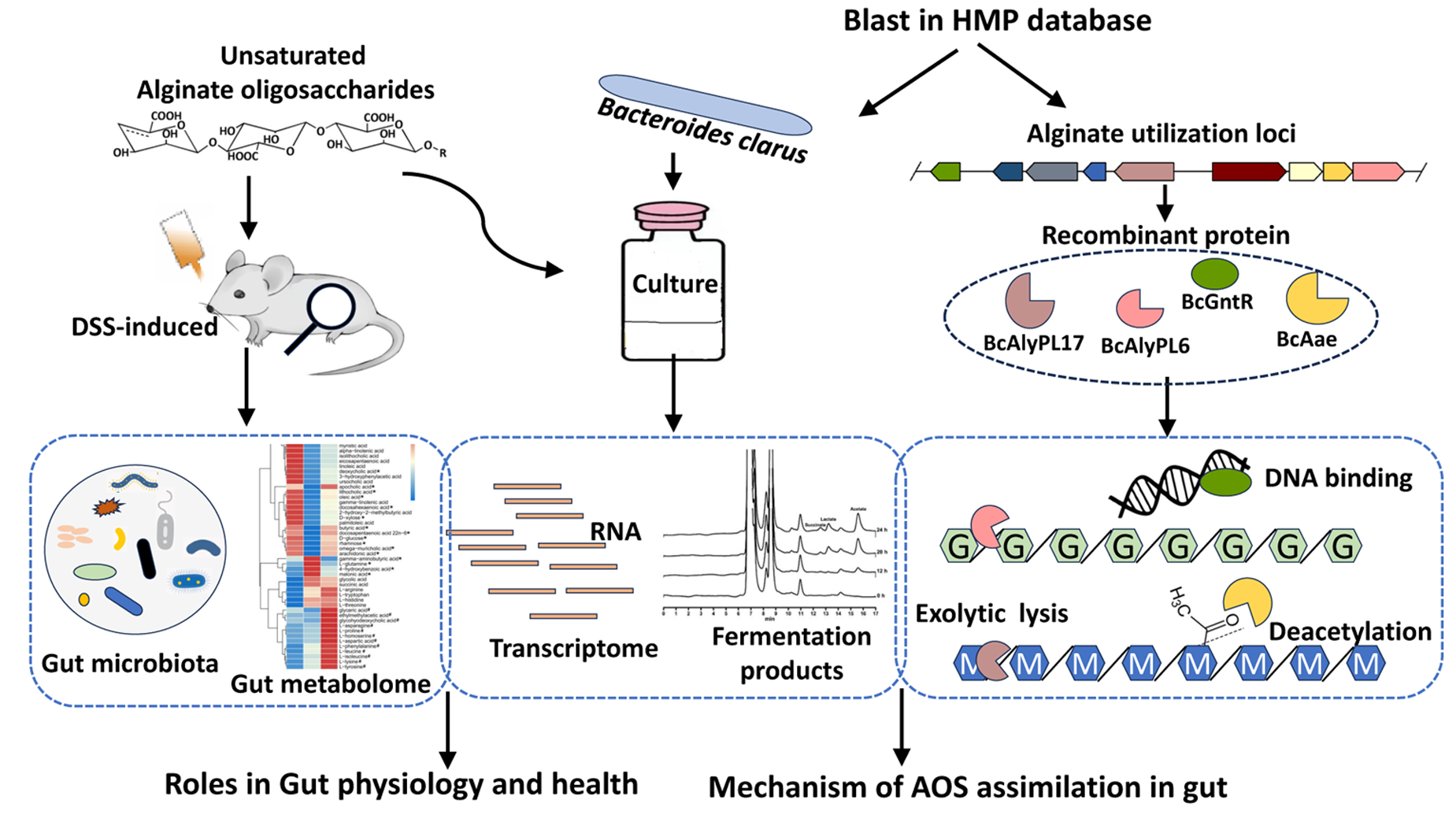The metabolism of dietary fiber by gut microorganisms plays important roles in host physiology and health. Seaweeds, such as Laminaria japonica Aresch and Sargassum fusiforme not only are part of the daily diet of humans living near the sea but have been used in traditional Chinese medicine for more than 2,000 years. Ancient manuscripts such as the Compendium of Materia Medica (‘Ben Cao Gang Mu’), ‘Zhong Hua Ben Cao’, and ‘Zhong Hua Hai Yang Ben Cao’ contain valuable information for the treatment of chronic bronchitis, acute esophagitis, and fistulas.
Alginate, the dominant component of brown algae cell walls, is a kind of linear polysaccharide consisting of β-D-mannuronic acid and α-L-guluronic acid. Alginate can be degraded by alginate lyase through β-elimination reaction, which produces unsaturated C-C bond at the nonreducing end of the resulting oligosaccharide. Modern pharmacological research has shown alginate oligosaccharides exhibit many fascinating bioactivities, such as anti-tumor and anti-inflammatory functions. Recent studies highlighted the significance of gut microbiota for the bioactivity of alignate oligosaccharides. Hence, the degradation and assimilation of alginate by gut microorganisms may play an important role for its bioactivity.
Recently, researchers have revealed the mechanism of alginate oligosaccharide assimilation by gut microorganisms and its potential role in gut inflammation alleviation. The work was published online in Applied and Environmental Microbiology on April 2 and was selected as spotlight article.
The metabolism of glycans by gut microorganisms depends on a series of colocalized genes organized as polysaccharide utilization loci (PUL). The alginate PUL was firstly identified from a marine flavobacterium and is believed to have been transferred into human gut Bacteroidetes. However, the mechanism of alginate metabolism in human gut remained unclear. In this study, the researchers explored alginate PULs in human gut microorganisms by blast in Human Microbiome Project database using sequences of characterized alginate lyases. 9 species out of 437 sequenced human gut microorganisms were predicted to harbor alginate PULs. Furthermore, Bacteroides clarus isolated from individuals of Japanese origin was used as a model to study the working details of alginate PUL.
The function of the alginate PUL was validated through transcriptomic assay and biochemical characterization, and a working model of the PUL that specifically utilizes unsaturated alginate oligosaccharides has been proposed. Transcriptomic data combined with fermentation products comparison indicated that compared with glucose metabolized through Embden-Meyerhof-Parnas pathway, the fermentation of alginate monosaccharides through Entner-Doudoroff pathway tunes the metabolism of short-chain fatty acids and amino acids due to the deficiency of reducing equivalents. Further mouse experiments have shown that oral supplementation of alginate oligosaccharides can remodel the gut microbiota and metabolome, thereby protect the mice against DSS-induced acute colitis.
This work was jointly guided by Professor Li Fuli from the C1 Biotechnology Research Center of Qingdao Institute of Bioenergy and Bioprocess Technology of the Chinese Academy of Sciences and Professor Yang Jinbo from the Innovation Center of Marine Drug Screening & Evaluation, Qingdao National Laboratory for Marine Science and Technology. This work was supported by the Key R&D Program of Shandong Province, the National Natural Science Foundation of China, the Shandong Province Major Scientific and Technological Innovation Project, and Shandong Provincial Key Laboratory Platform Project (Text/Image: Ma Xiaoqing).

Xiao-Qing Ma#; Bing Wang#; Wei Wei#; Fang-Cheng Tan; Hang Su; Jun-Zhe Zhang; Chen-Yang Zhao; Hua-Jun Zheng; Yan-Qin Feng; Wei Shen; Jin-Bo Yang*; Fu-Li Li*; Alginate oligosaccharide assimilation by gut microorganisms and the potential role in gut inflammation alleviation, Applied and Environmental Microbiology, 2024. May 21; 90(5): e0004624. https://doi.org/10.1128/aem.00046-24